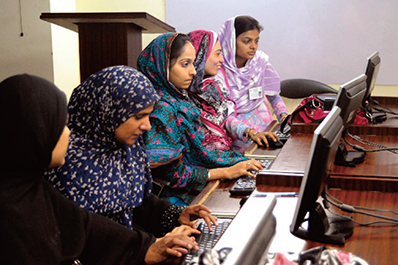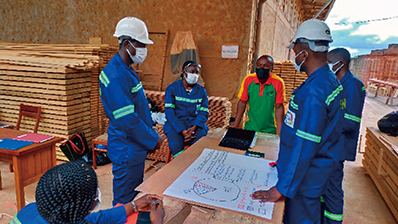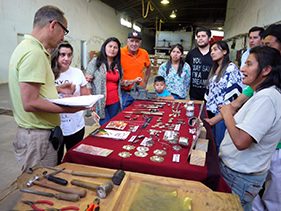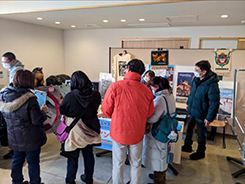(4) Vocational Training, Industrial Human Resources Development, and Employment Creation
For quality growth, it is essential to acquire vocational skills, obtain stable employment, and increase income. In developing countries, however, opportunities to receive education and training are limited, which poses a major obstacle to industrial development in those countries.
Moreover, in order to create stable employment under the uncertain global employment situation, each country must urgently prepare for risks by building social safety nets, Note 24 as well as engage in an international effort to realize decent work, stipulated in SDG 8.
● Japan’s Efforts
■ Vocational Training and Industrial Human Resources Development

Pakistani women receiving e-commerce technology training through the project of the Women Entrepreneurs Finance Initiative (We-Fi) (Photo: World Bank)

KAIZEN Consultant candidates and trainees from Cameroon provide instruction to wood processors through the technical cooperation “Project on Integrated SME Promotion with the Enhancement of KAIZEN” in Cameroon (Photo: JICA)
With the aim of assisting developing countries in fostering human resources who can respond to diverse needs in technology and technical skills, Japan provides support to leading polytechnic and vocational training schools, which will serve as core centers in each country. In implementing this assistance, Japan, in cooperation with the private sector, supports the capacity building of teachers and trainers, the reinforcement of the operational capacity of training schools, and curriculum improvement in order to further strengthen the linkages between education and employment.
In the field of industrial human resources development, Japan implemented 10 comprehensive cooperation projects in nine countries between 2016 and 2021. The projects drew on Japan’s insight and know-how for the development and revision of curriculums and teaching materials, capacity development of trainers, and collaboration with the industrial sector. As a result, Japan provided support for improving facilities and equipment at 15 schools, as well as Technical and Vocational Education and Training (TVET) institutions. In 2021, Japan also contributed to skill development through 21 projects in 59 countries and regions, with the aim of improving the livelihoods of women, persons with disabilities, and demobilized soldiers, as well as refugees and others whose lives have been impacted by conflicts.
In Asia, with a view towards the 50th Year of ASEAN-Japan Friendship and Cooperation in 2023, Japan has implemented the “Industrial Human Resource Development Cooperation Initiative 2.0,” Note 25 which aims to support industrial human resources development of approximately 80,000 people in Asia over five years from 2018. In this initiative, Japan has steadily implemented human resources development in cooperative fields for industrial advancement capabilities, including in AI and other digital fields, in addition to cooperation in practical technology, design and development capabilities, innovation, business administration, planning, and management capabilities, which have been emphasized thus far.
The “Innovative Asia” Initiative, which has been implemented since FY2017, also provides excellent science and technology students from developing countries in Asia with opportunities to study abroad and intern at companies in Japan to promote the circulation of highly-skilled human resources between Japan and other Asian countries.
In addition, the Ministry of Health, Labour and Welfare (MHLW) conducts training both in Japan and in targeted countries primarily from Southeast Asia. Note 26 The training Note 27 is designed to transfer the government and private sector’s accumulated know-how on Japan’s skills evaluation system (Japan’s National Trade Skill Test and Certification) to those in targeted countries, with a view to developing and securing a quality workforce. In FY2020, a total of 95 people from four countries participated in these training programs. The training is expected to develop and improve skills evaluation systems in these countries, which in turn will promote the development of their skilled workers and elevate their social standing through increased employment opportunities.
In relation to Africa, Japan highlighted the assistance in developing industrial human resources as part of Japan’s contributions for Africa announced at TICAD7 held in 2019. Japan has been implementing its commitment, aiming to train 140,000 people in order to diversify industries and create jobs in such areas as innovation, agriculture and blue economy Note 28 through the KAIZEN Initiative, vocational training centers, and technical assistance by AfDB’s trust fund. Japan’s efforts also go on in training 3,000 people as industrial human resources to promote business between Japan and Africa in six years through the African Business Education Initiative for Youth (ABE Initiative 3.0)*. Through the ABE Initiative, which is driven by industry-academia-government cooperation, Japan has already provided training opportunities to approximately 1,600 trainees with the cooperation of 77 universities throughout Japan by the end of December 2021.
■ Employment, Including Job Creation
Japan also provides support in the area of employment. The spread of COVID-19 has had major socio-economic impacts on various countries, with particularly great effects on socially vulnerable people including youth and women. In light of this, there is a strong international need for support and measures to realize decent work for all workers. Japan provides technical cooperation primarily in the Asian region for the enhancement of security and hygienic standards of work as well as the improvement of social insurance systems, through means such as voluntary contributions to the ILO. In addition, Japan is also providing employment support for youth and others in Ethiopia, Gambia, Mauritania, Mozambique, and Sudan, so that Japan contributes to the realization of “decent work” in Africa.
Glossary
- African Business Education Initiative for Youth (ABE Initiative)
- A program launched at TICAD V in 2013 with the aim of promoting human resources development for business and industry in Africa and fostering “navigators” who will support the business activities of Japanese companies in Africa. It was announced at TICAD VI (2016) and TICAD7 (2019) that the program would continue. Under the program, Japan invites youth in Africa to Japan and provides them with opportunities to gain master’s degrees at Japanese universities, as well as business programs such as internships at Japanese companies, Japanese language training, and entrepreneurship training.
- Science and Technology Research Partnership for Sustainable Development (SATREPS) program → See also “Master Techniques from Japan to the World 3” and “Master Techniques from Japan to the World 4”
- Through the collaboration of Japan’s advanced science and technology and ODA, SATREPS is an initiative to conduct research to solve global issues relating to the environment and energy, bio-resources, disaster prevention and mitigation, and infectious diseases. Under this program, research institutes both in developing countries and Japan work together to conduct international joint research with the following objectives: (i) strengthening international science and technology cooperation, (ii) acquiring new expertise and technologies that will lead to resolving global issues, and using these to create innovation, and (iii) capacity development. The Ministry of Foreign Affairs (MOFA) and JICA, in collaboration with the Ministry of Education, Culture, Sports, Science and Technology (MEXT), the Japan Science and Technology Agency (JST), and the Japan Agency for Medical Research and Development (AMED), provide support to research institutes and researchers in Japan and the developing countries.
Argentina
Project for Development of Inclusive Value Chains Oriented to the Market with OVOP Argentina Concept
Technical Cooperation Project (June 2019 – March 2025)
In Argentina, poverty and income disparities in rural areas have become a problem and it is required to make policies to promote self-sustaining regional development through support for production activities and human resources development. However, there was not enough development of value-added products that meet market needs and continuous human resources development.
This project started in June 2019 targeting five provinces*1 of Argentina upon a request by the Government of Argentina, which had become interested in regional development utilizing Japan’s One Village, One Product (OVOP) Campaign.*2 The project has implemented capacity building of the Ministry of Health and Social Development and the development, improvement, and sales-promotion of products reflecting the market needs of each region. The project has also supported the establishment of value chains from production to sale that embody as one added value social inclusiveness including NGOs that support local residents and communities such as women and young people.
Immediately after the start of this project, it became impossible to travel to Argentina due to the spread of COVID-19. Therefore, activities were carried out online from June 2020 onwards, and a total of 19 seminars were held over FY2020 including the introduction of examples of the OVOP in Japan and overseas, and lectures on value chains, among other topics. With regard to promoting indigenous culture, in which Argentina is highly interested, exhibitions and promotional activities featuring processed agricultural products and traditional artifacts from the Argentinian provinces were held at Shiraoi Town, Hokkaido Prefecture, which practices the creation of the local attractions by maintaining and passing on traditional Ainu crafts and indigenous culture. Questionnaires were also circulated among visitors to the exhibition.
Such creative and deeply thought out efforts, as well as the enthusiasm shown by the people involved, earned high appreciation from the Government of Argentina, and there are high expectations for future development of this project. Japan will continue to advance assistance for regional development tailored to Argentina.

Instruction being given on a visit to handicraft producers in Salta Province (Photo: JICA)

Implementing exhibition and promotional activities featuring processed agricultural products and traditional crafts, etc., at Shiraoi Town, Hokkaido Prefecture (Photo: JICA)
*1 The five provinces of Salta, Chaco, Misiones, Catamarca and Buenos Aires in North East and North West area of Argentina.
*2 See the glossary.
- Note 24: Mechanisms in which people can live in safety and without difficulties.
- Note 25: The “Industrial Human Resource Development Cooperation Initiative,” which was announced at the ASEAN-Japan Summit Meeting in 2015, was achieved and far exceeded the original goal of assisting industrial human resources development of 40,000 people over three years. Following this, Japan announced the “Industrial Human Resource Development Cooperation Initiative 2.0” at the ASEAN-Japan Summit Meeting in 2018.
- Note 26: The target countries are Cambodia, Indonesia, Myanmar, and Viet Nam.
- Note 27: There are three types of training in this project: “training for people in charge of the creation of test standards and test problems,” “training for people in charge of tests and marking,” and “training for people in charge of trial certification evaluation.” The number of participants above is the total value for all types of training.
- Note 28: The blue economy aims to balance the conservation of ocean resources and economic development through the sustainable use of resources from the oceans, rivers, lakes, and more.
